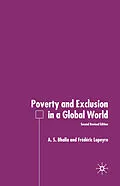This volume looks at the three dimensions of social exclusion: economic, social and political. Exclusion is analyzed as a new approach to such issues as the 'new' poverty, precariousness, long-term unemployment, social polarization and lack of citizenship. The book shows how relational and distributional aspects of poverty are interlinked.
Autorentext
A.S. BHALLA is an Economic Consultant based in Geneva, Switzerland. He was formerly Fellow of Sidney Sussex College at the University of Cambridge, UK and Special Advisor to the President of International Development Research Centre, Ottawa. Dr Bhalla has also held academic positions at the Universities of Yale, Manchester and Oxford.
FRÉDÉRIC LAPEYRE is Professor at the Institute of Development Studies of the Catholic University of Louvain and member of the United Nations Intellectual History Project. Previously, he was Associate Professor at the Graduate Institute of Development Studies in Geneva, and Fulbright Fellow at Brown University. He has contributed to the work of the World Commission on the Social Dimension of Globalization established by the International Labour Organization in February 2002. Prior to that, he worked with the Council of Europe and the ILO in the framework of poverty and social exclusion research and applied programmes.
Zusammenfassung
This book investigates the notion of social exclusion as a new way to approach issues such as the 'new' poverty - long-term unemployment, precariousness, social polarization and disintegration. Particular attention is paid both to the global relevance of an approach in terms of social exclusion, and also its value compared with more conventional approaches to poverty and deprivation. It is shown that social exclusion goes beyond these by explicitly embracing the relational as well as the distributional aspects of poverty.The authors explore the specific forms of social exclusion in the ongoing processes of globalization, deregulation, the crisis of the welfare state and the rise of individualism. Successive chapters provide an analytical and operational framework that focuses not so much on social exclusion as a state of economic and social deprivation as on the dynamic processes that create such a state and push individuals into precariousness, vulnerability and, finally, exclusion.The book emphasizes that what has been happening to exclusion (as the new social question) is a fundamental question which needs to be posed about the present pattern of development shaped by market forces on a global scale.This second, substantially revised, edition contains a new chapter on the transition economies of Eastern Europe and Central Asia, and thus extends the scope of the book to all the three major groups of countries in the world. It attempts to show whether the nature of poverty and social exclusion is similar in the Western industrialized countries, the transition economies and the developing countries. Substantive new sections have been added on a capability approach to exclusion, on 'social capital' and on the European Union strategy to fight social exclusion.
Inhalt
Defining Exclusion Towards an Analytical and Operational Framework Unemployment, Precarious Jobs and Exclusion Exclusion in Developed Countries The Transition Economies: Central and Eastern Europe The Case of Central Asian Republics Exclusion in Developing Countries Globalization and Exclusion
